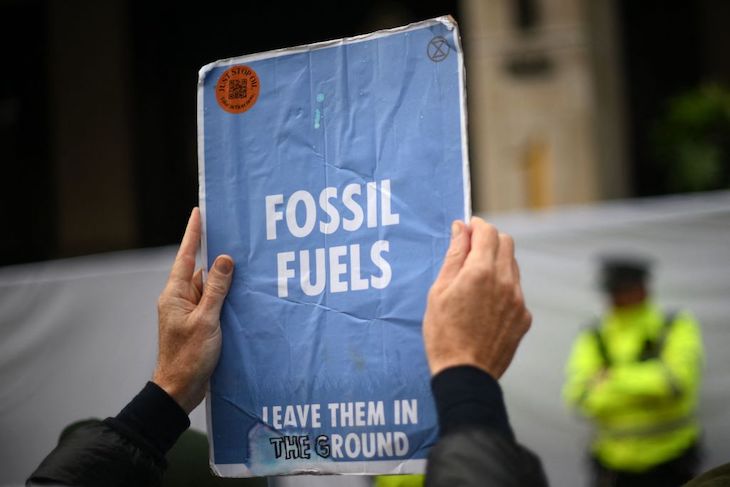Kemi Badenoch’s rediscovery of the North Sea oil and gas industry would be more convincing had it not been successive Conservative governments that promoted its decline in the first place. In a speech in Aberdeen today, she will call for “every last drop” of oil to be extracted from our waters. Contrary to popular belief, there is still a lot of the black stuff lying there: up to 15 billion barrels, or enough to fuel the UK for 30 years.
Norway has been drilling in the Arctic. “Bor ja Bor” (“Drill, baby, drill”), as they say in the Storting
No one really knows how much is left because, while the North Sea may be in long-term decline, new deposits are constantly being discovered. Just last month, Norway made one of its biggest finds in a decade in the Yggdrasil field, which had been thought exhausted. Norway, normally considered an environmental icon, never abandoned the North Sea. Indeed, it has been drilling in the Arctic. “Bor ja Bor” (“Drill, baby, drill”), as they say in the Storting.
But Britain has opted for a different, misguided approach. When he was prime minister, Boris Johnson jumped on board the Net Zero bandwagon. At COP26 in Glasgow in 2021, Johnson promised to remove fossil fuels from electricity generation by 2035. The jamboree at which that pledge was made resembles a quasi-religious psychodrama – a climate epiphany promoted by a child saint, Greta Thunberg. Yet oil and gas was, and remains, one of Britain’s key industries. It is essential to our economic survival.
Around three quarters of the energy we use is still fossil fuel-based. Transport, industry, construction and agriculture all depend on it, and this is not going to change any time soon. The NHS would collapse without it. Millions are already being plunged into fuel poverty because of the reckless increase in energy bills, inflated by the “network and policy costs” of the transition to renewables.
British industry is burdened with electricity costs which are up to twice as high as in Germany, and nearly four times the cost of those in the United States. This is why Keir Starmer will almost certainly have to follow Badenoch’s lead if he wants Britain to generate economic growth. Indeed, he is already doing so. Labour has quietly opened the door to exploitation of the recently discovered Rosebank field, off Shetland, and Jackdaw, off Aberdeen, despite a UK court ruling earlier this year that they were unlawful.
The 78 per cent windfall tax on oil and gas firms – and the ban on new exploration – are pointless exercises in economic self-harm. It is probably too late to halt the stampede of oil and gas companies from Aberdeen, but that does not mean it is wrong to try. As anyone in the field knows, it is the energy companies that have many of the skills and technology required to build and service wind turbines.
To abandon our own limited reserves of these essential fossil fuels in order to import them from abroad never made any sense. Yet governments have been paralysed by misplaced climate altruism: a belief that this country, which contributes only 1 per cent of global CO2 emissions, could somehow save the planet by freezing old people and wrecking the economy.
Britain remains one of the few countries actually to have honoured its climate change promises. We have halved emissions since 1990, despite the economy growing to three times the size. Meanwhile, countries like China have been opening new coal-fired power stations by the week.
Importing oil thousands of miles by tanker increases our carbon footprint. The UK has closed down most of our oil refineries, which means sending crude to Rotterdam for processing. Grangemouth, Scotland’s last petrochemical refinery, is to become a terminal for imported oil and gas. There could be no better illustration of the idiocy of our energy policy.
There is nothing to be gained by the accelerated decline of the North Sea. Importing oil and gas won’t bring Net Zero any closer. All it has achieved is to turn public opinion against the project and to fuel the rise of Reform, which is registering stunning gains in popularity in Scotland, in large part because of its call to abandon Net Zero altogether.
The climate catastrophism of activists like Just Stop Oil has been so counterproductive that even they have shut up shop. The Scottish government is rethinking its energy policy and now claims, improbably, that it never ruled out new oil and gas development.
A winter of discontent is looming as the energy price cap keeps rising. Domestic fuel bills are still 50 per cent higher than before the Ukraine invasion. Net Zero Secretary Ed Miliband’s promise to cut bills by £300 will remain an “Edstone” around Keir Starmer’s neck all the way to the next election. U-turn if you want to, to paraphrased Mrs T, Kemi is for turning.








Comments